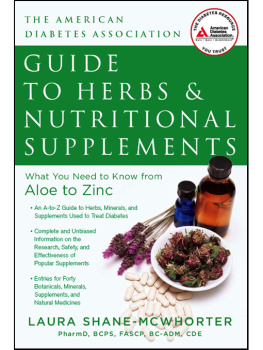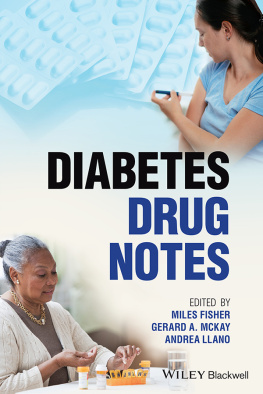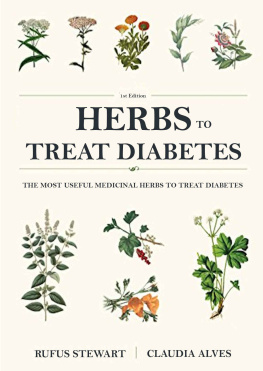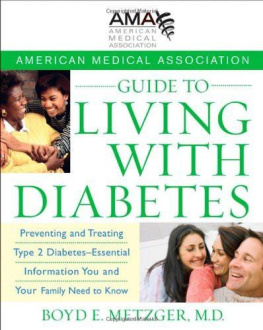
Contributing Writer, Kate Ruder; Director, Book Publishing, Robert Anthony; Managing Editor, Book Publishing, Abe Ogden; Production Manager, Melissa Sprott; Cover Design, Jody Billert; Printer, Data Reproductions Corporation.
2009 by the American Diabetes Association, Inc. All Rights Reserved. No part of this publication may be reproduced or transmitted in any form or by any means, electronic or mechanical, including duplication, recording, or any information storage and retrieval system, without the prior written permission of the American Diabetes Association.
Printed in the United States of America
1 3 5 7 9 10 8 6 4 2
The suggestions and information contained in this publication are generally consistent with the Clinical Practice Recommendations and other policies of the American Diabetes Association, but they do not represent the policy or position of the Association or any of its boards or committees. Reasonable steps have been taken to ensure the accuracy of the information presented. However, the American Diabetes Association cannot ensure the safety or efficacy of any product or service described in this publication. Individuals are advised to consult a physician or other appropriate health care professional before undertaking any diet or exercise program or taking any medication referred to in this publication. Professionals must use and apply their own professional judgment, experience, and training and should not rely solely on the information contained in this publication before prescribing any diet, exercise, or medication. The American Diabetes Associationits officers, directors, employees, volunteers, and membersassumes no responsibility or liability for personal or other injury, loss, or damage that may result from the suggestions or information in this publication.
 The paper in this publication meets the requirements of the ANSI Standard Z39.48-1992 (permanence of paper).
The paper in this publication meets the requirements of the ANSI Standard Z39.48-1992 (permanence of paper).
ADA titles may be purchased for business or promotional use or for special sales. To purchase more than 50 copies of this book at a discount, or for custom editions of this book with your logo, contact the American Diabetes Association at the address below, at booksales@diabetes.org, or by calling 703-299-2046.
American Diabetes Association
1701 North Beauregard Street
Alexandria, Virginia 22311
DOI: 10.2337/9781580403184
Library of Congress Cataloging-in-Publication Data
Shane-McWhorter, Laura.
The American Diabetes Association guide to herbs and nutritional supplements : what you need to know from aloe to zinc / Laura Shane-McWhorter.
p. cm.
Includes bibliographical references and index.
ISBN 978-1-58040-318-4 (alk. paper)
1. DiabetesAlternative treatment. 2. DiabetesDiet therapy. 3. Dietary supplement. 4. HerbsTherapeutic use. I. American Diabetes Association. II. Title. III. Title: Guide to herbs and nutritional supplements.
RC661. A47S528 2009
616.46206dc22
2009033623
eISBN: 978-1-58040-385-6
CONTENTS
As a pharmacist for more than twenty years, I have worked with hundreds of people who want to use dietary supplements to better treat their diabetes. Some people view supplements as healthier alternatives to harsh prescription medications. Others take dietary supplements in addition to prescribed medications to treat their blood glucose or complications of diabetes. What all these patients need is guidance on the benefits and cautions of using these substances.
Two of my patients with diabetes who have used dietary supplements (their names and some details have been changed) illustrate this need.
One patient was a middle-aged woman named Jackie, who had just been diagnosed with type 2 diabetes. She had already been taking medications for her high blood pressure and depression. Jackies doctor recommended that she check her blood glucose regularly, take a new prescription diabetes medication, and lose 20 pounds by eating well and exercising more regularly.
Jackie decided that there must be a better way, so she made a trip to her local vitamin store to ask about products that she could use instead of prescription medications. At the vitamin store, an eager, pleasant employee told Jackie that she should start taking a variety of products such as ginseng, bitter melon, fenugreek, chromium, and vanadium. When Jackie asked whether she should be aware of any side effects or drug interactions, the well-meaning store clerk told her that dietary supplements are natural and do not have any side effects or drug interactions. Jackie was so encouraged that she stopped taking her prescription medications and bought only natural products for her high blood pressure, depression, and newly diagnosed diabetes.
After a few weeks, Jackie returned to her doctor because she was not feeling well, and she thought that she might have bladder infection. Her doctor asked whether she was taking her newly prescribed diabetes medication, as well as her medications for high blood pressure and depression. Jackie explained that she was taking only natural products. Her doctor then informed her that her blood glucose and blood pressure were sky high and that she did indeed have a bladder infection.
Another patient I remember was Davida lean, well-educated retired professor of anthropology. Davids physician had referred David to me to discuss his dietary supplement use. He had recently been diagnosed with diabetes, and he had made many lifestyle changes in order to treat his diabetes. He gave up eating meats of any sort and became a strict vegetarian. He started walkingthen runningabout 2 miles daily. He also purchased many dietary supplements. When he showed me his supplements (about 17 different bottles) I asked him why he was taking each of the products. Some were to increase energy, some were for high blood pressure, some were for high cholesterol, and some were for diabetes. He had started these products because he felt that a natural approach would be best to treat his medical conditions. After scrutinizing the bottles and ingredients, I noted that many of the products had some of the same ingredients, and several of the products had very high doses of vitamins. Furthermore, although David had indeed lost about 10% of his body weight, and his blood pressure, cholesterol, and blood glucose levels had decreased somewhat, they were still higher than target goals. My advice was to consolidate some of the different products and then to reinstate his prescription medications.

Where should Jackie and David have turned for information on taking dietary supplements? There isnt an easy answer. Some patients have a strong desire to self-treat a disease such as diabetes with dietary supplements. This desire may come from the emotional component of wellness and healing and the widely held belief that dietary supplements are natural and can thus cause no harm.
This book is intended to help others like Jackie and David find more information about commonly used dietary supplements for diabetes and its related conditions. This book doesnot recommend specific supplements or brands. Instead, it gives general information on the safety and efficacy of some commonly used supplements. It also provides specific information about how supplements work, possible side effects and drug interactions, and suggestions as to what patients should look for if they decide to use a particular product. Patients should always talk with their health care providers about any dietary supplements they are planning to take.
Next page














 The paper in this publication meets the requirements of the ANSI Standard Z39.48-1992 (permanence of paper).
The paper in this publication meets the requirements of the ANSI Standard Z39.48-1992 (permanence of paper).